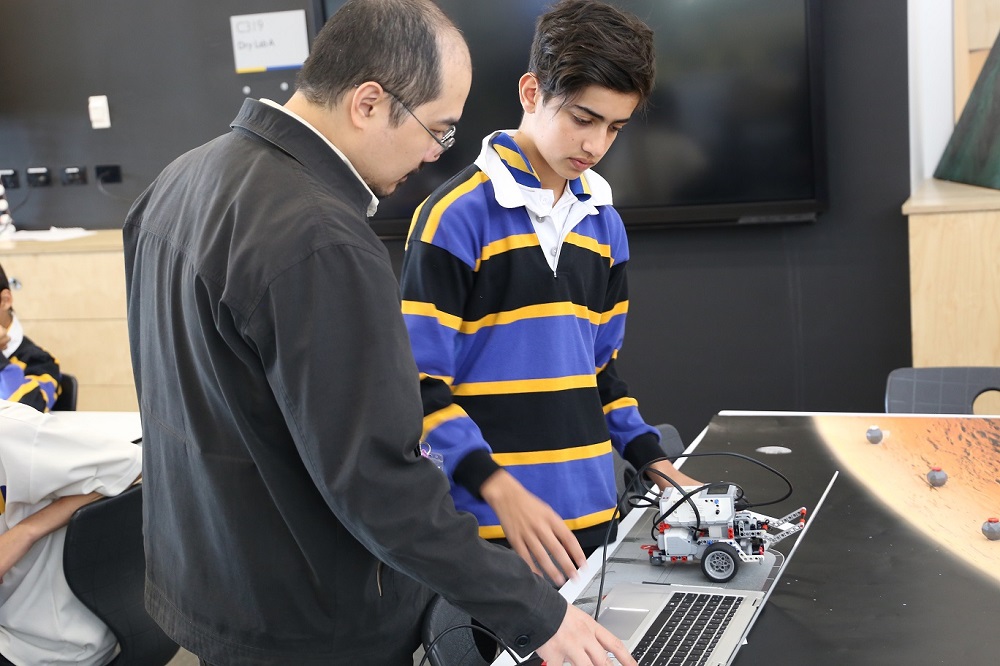
A program launched by Carey Baptist Grammar School has doubled students’ participation in Digital Technologies, spurring a new and exciting wave of creativity and innovation in the important subject.
The Creative Silicon Chips program, which provides a ‘choose-your-own-adventure’ model of learning offers students a wide range of rich learning experiences in areas like programming, robotics, web development and computer science over three years.
The impetus for the program was the realisation that Digital Technologies classes at Carey were quite basic and limited in scope, availability and the ability to differentiate for different aptitude levels.
Students who were particularly interested in computing and ICT also had few options to pursue their strengths and build on their skills.
In response to these shortcomings, Digital Technologies teacher Tue Nguyen drew upon his Master of Education in Digital Learning and consulted with students, other teachers, school management and parents to develop a negotiated, choice-based Digital Technologies curriculum.
In recognition of the success the program has been having, Carey Baptist Grammar School has been named a finalist for the Innovation in Curriculum Design Award ahead of the Australian Education Awards 2020.
Below, The Educator speaks to Nguyen about the program and its importance to curriculum design in 2020.
TE: Can you talk us through the development of the school’s ‘Creative Silicon Chips’ subject and its importance to curriculum design in 2020?
JW: Prior to the launch of Creative Silicon Chips (CSC), Digital Technologies were offered as separate single-semester electives with a narrow focus on specific technologies and were often locked to particular year levels. With CSC, we combined our experience and research to create a choice-based and negotiated curriculum, offering a broad spectrum of technologies to all students from Year 8 to Year 10. Supported by flexible, non-linear curriculum content and sophisticated learning technologies, the subject places a strong emphasis on personalised and interest-driven learning, allowing students to engage directly with teachers to create their own unique pathways. With the uncertainty of 2020, we are further convinced that innovations in education will continue to play a pivotal role in shaping the world of tomorrow through the development of our learners today.
TE: In your view, what are the most powerful and promising benefits of this subject for students, and have there been any notable early outcomes you can share?
JW: We believe that through this curriculum, our students will be well equipped with skills and attributes to become wise, independent, and life-long learners in our ever-changing world. Despite the vast amount of content available, CSC is actually very focussed on learning skills instead, with its motto being, “It’s not how much you know, it’s how fast you can learn.” By cultivating passion, dynamism and fearlessness in our learners, our students discover their own unique potentials and they can effectively solve problems to realise their learning goals. Throughout the first two-years of CSC, we have experienced a very significant increase in enrolment, and we have discovered many highly able students who could accomplish far beyond their expected year levels. With CSC students, we also expect to have a strong influx of experienced students moving into VCE Applied Computing courses in the senior years, who will undoubtedly raise the bar for teaching and learning at those levels as well.
TE: I understand that the number of enrolments in Digital Technologies at Carey has effectively doubled and female participation in Digital Technologies also increased markedly. What do you believe have been the most significant drivers of this uptick in engagement?
JW: CSC completely changed the structure of how Digital Technologies is taught at Carey. First, students are able to choose to learn what they want and directly negotiate the terms of their assessments with their teachers. Second, students are encouraged to work together in interdisciplinary teams to tackle realistic problems, which celebrates their individuality while creating meanings and contexts for their work. As such, CSC has developed a reputation of inclusiveness and fun, which has attracted a very broad range of interests and aspirations from all students, gradually tearing down traditional gender stereotypes along the way. The unified CSC curriculum is also available every semester, allowing students to repeat it as many as five times from Year 8 to Year 10 (without running out of choices). This operational flexibility and richness of content allow students to coordinate subject selection with their friends and forge a coherent and continuous pathway all the way to Year 12. That solid structural support is also a key driver in the success of CSC.
TE: Looking ahead, how will the school be building on the great work it has done in curriculum design to continue thriving in 2021?
The open and flexible nature of CSC requires that we embrace changes. The disruption of the pandemic in 2020 has highlighted the resilience of CSC as a curriculum and as a cohort of learners, as seen through our seamless transition to online remote learning. Going forwards, we will continue to improve our learning infrastructure to be more robust and user-friendly, ensuring that our students will have the most streamlined and engaging experience, wherever they are. Similarly, our curriculum content will also need to evolve with our teachers and students, as we continue to look for ways to address the needs and uniqueness of our yearly cohorts. The quality of our teachers was also a major factor in our resilience – the CSC curriculum demands our teachers to be proficient and passionate learners themselves. As teachers, we will continue to strengthen our capacity to work in flexible ways to support our highly diverse students and each other. Lastly, we will continue to share our experience and lessons learned from CSC with the broader school community, so every aspect of our school can be improved and contribute to the development of our wise and independent learners, who are ready for anything that the future might hold.


